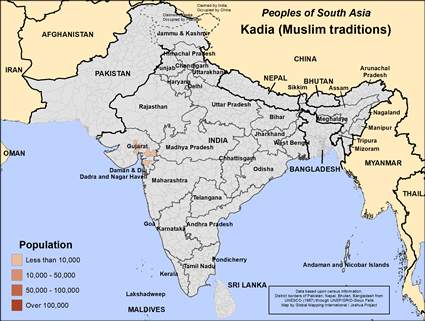The Kadia people in Gujarat have a background deeply rooted in masonry and construction. They primarily speak Gujarati, which connects them to the region's linguistic and cultural heritage. Some are Muslims and others are Hindu.
Muslim Kadia people live in urban and rural areas, focusing on construction work and small-scale agriculture. They are skilled masons and builders, often working on construction projects across Gujarat. They also grow crops such as wheat, rice, and vegetables. Their communities emphasize strong family bonds and mutual support. Their diet includes both vegetarian and non-vegetarian food, featuring staples like rice, lentils, vegetables and occasionally meat. Traditional dishes such as dal (lentil soup) and roti (flatbread) are common in their meals. Weddings among the Kadia are elaborate, involving rituals like the exchange of garlands, sacred fire ceremonies, and celebrations with music and dance. These practices highlight the importance of family and community.
The Kadia people are Sunni Muslims who believe that the supreme God, Allah, spoke through his prophet, Mohammed, and taught mankind how to live a righteous life through the Koran and the Hadith. To live a righteous life, you must utter the Shahada (a statement of faith), pray five times a day facing Mecca, fast from sunup to sundown during the month of Ramadan, give alms to the poor, and make a pilgrimage to Mecca if you have the means. Muslims are prohibited from drinking alcohol, eating pork, gambling, stealing slandering and making idols. They gather for corporate prayer on Friday afternoons at a mosque, their place of worship.
The two main holidays for Sunni Muslims are Eid al Fitr, the breaking of the monthly fast and Eid al Adha, the celebration of Abraham's willingness to sacrifice his son to Allah.
Sunni religious practices are staid and simple. They believe that Allah has pre-determined our fates; they minimize free will.
In most of the Muslim world, people depend on the spirit world for their daily needs since they regard Allah as too distant. Allah may determine their eternal salvation, but the spirits determine how well we live in our daily lives. For that reason, they must appease the spirits. They often use charms and amulets to help them with spiritual forces.
The Kadia people need better access to quality education to provide more opportunities for their children. Improved healthcare services are essential due to the limited availability of medical facilities and high rates of preventable diseases. Economic support through modern construction techniques, market access, and vocational training can enhance their livelihoods. Infrastructure development, including better roads, clean water supplies, and reliable electricity, will greatly benefit the Kadia community. Addressing these needs will help the Kadia people achieve greater socio-economic stability while preserving their cultural and religious heritage.
Pray for a movement of Jesus to heal and strengthen Muslim Kadia communities.
Pray for a "Book of Acts" type of movement to Christ among the Kadia people.
Pray for the Kadia people to understand and embrace that Jesus wants to bless their families and neighborhoods.
Pray for Holy Spirit anointed believers from the Kadia people to change their society from within.
Pray for a movement in which the Holy Spirit leads and empowers disciples to make more disciples.
Scripture Prayers for the Kadia (Muslim traditions) in India.
Cultural Traditions of Gujarat, Ministry of Culture, Government of India, 2017.
Sharma, B.K., "Construction Practices in Western India," Mittal Publications, 2012.
"Rural and Urban Development in Gujarat," Ministry of Rural Development, Governme
| Profile Source: Joshua Project |











